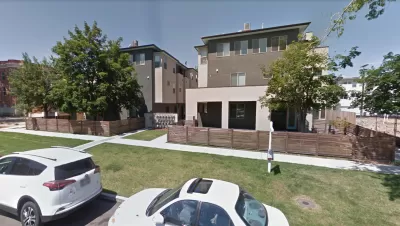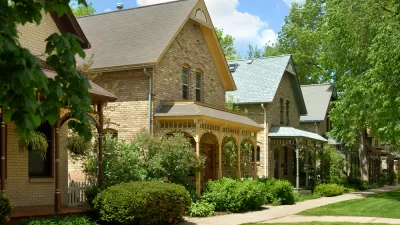Members of the Cleveland Chapter if the American Institute of Architects are raising awareness about the unintended consequences of zoning changes made in 2018 to make it easier to develop townhomes in the city.

Steven Litt reports on increasing political pressure for the city of Cleveland to repeal and revise a section of its zoning code pertaining to townhouses.
The city updated its zoning code in 2018 to streamline the approvals process for townhouses.
"Since then, the city’s Planning Commission has approved more than two dozen townhouse projects primarily in Ohio City and Detroit Shoreway on the West Side, but also in Glenville on the East Side. It’s all part of the mission to rebuild a city that has been losing population and tax base for decades," writes Litt.
A growing chorus of critics includes the Cleveland Chapter of the American Institute of Architects, which says "the 2018 ordinance has weakened the regulation of townhouse design, and the ability of residents to have their say in the approval process," according to Litt. The chapter has submitted a 44-page document asking the city to repeal and replace the townhouse code.
According to the document and from AIA members quoted in the article, developers are abusing the new provisions for townhouses in the city's zoning code. Rather than townhouses resembling the gentle density pursued by the Missing Middle Housing reform movement that is growing in popularity around the country, the architects say the result of the zoning changes in Cleveland has resembled the "slot homes" prohibited in the city of Denver in 2018.
Litt explains in useful detail:
The ground floors of the new townhouses are often dominated by garages and driveways, oriented sideways to the street. The “front doors” of such units are often set along narrow side alleys, or “interior frontages” facing the sides and backyards of adjacent single-family houses.
Even worse are projects configured with parallel rows of townhouses set at right angles to streets, with a central driveway lined with garage doors running down the middle.
To differentiate the results in the city of Cleveland from the desire for Missing Middle Housing, Litt cites Dan Parolek, who coined the term and also wrote the definitive book on the subject. In the article, Parolek cautions against what he calls "tuck under" townhouses—"with garages on the ground floor, built on scattered 'infill' lots in established neighborhoods"—which is what Cleveland has been allowing since the zoning change took effect.
FULL STORY: Critics want Cleveland to replace zoning code allowing controversial, oversized townhouses, ‘slot houses’

Planetizen Federal Action Tracker
A weekly monitor of how Trump’s orders and actions are impacting planners and planning in America.

San Francisco's School District Spent $105M To Build Affordable Housing for Teachers — And That's Just the Beginning
SFUSD joins a growing list of school districts using their land holdings to address housing affordability challenges faced by their own employees.

The Tiny, Adorable $7,000 Car Turning Japan Onto EVs
The single seat Mibot charges from a regular plug as quickly as an iPad, and is about half the price of an average EV.

As Trump Phases Out FEMA, Is It Time to Flee the Floodplains?
With less federal funding available for disaster relief efforts, the need to relocate at-risk communities is more urgent than ever.

With Protected Lanes, 460% More People Commute by Bike
For those needing more ammo, more data proving what we already knew is here.

In More Metros Than You’d Think, Suburbs are Now More Expensive Than the City
If you're moving to the burbs to save on square footage, data shows you should think again.
Urban Design for Planners 1: Software Tools
This six-course series explores essential urban design concepts using open source software and equips planners with the tools they need to participate fully in the urban design process.
Planning for Universal Design
Learn the tools for implementing Universal Design in planning regulations.
Smith Gee Studio
City of Charlotte
City of Camden Redevelopment Agency
City of Astoria
Transportation Research & Education Center (TREC) at Portland State University
US High Speed Rail Association
City of Camden Redevelopment Agency
Municipality of Princeton (NJ)





























